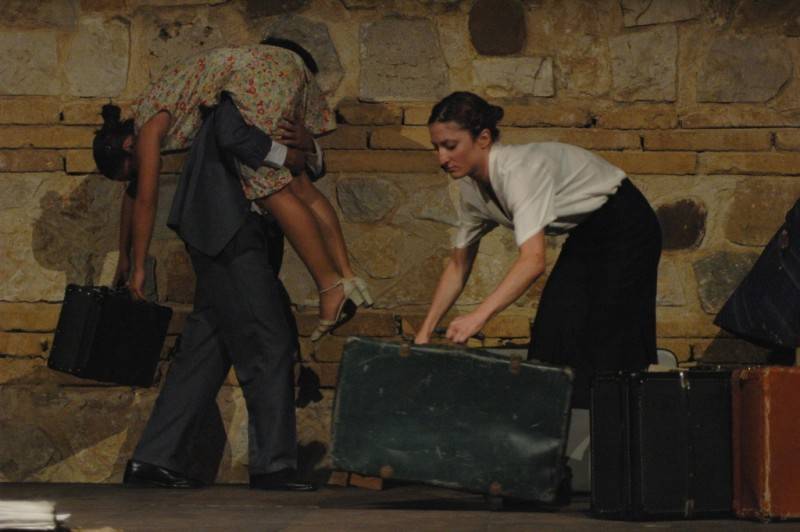La Spartenza – Unforgettable Suitcases
In the theater, the atmosphere was different; it had an air of intimacy, of home. The audience’s eyes were not focused on the stage, which remained dark and almost seemed to be a neglected bystander. Sitting on chairs arranged in a semi-circle, the audience instead watched the actors up-close, heard them breathe, and entered into their family.
It seemed that in the end, the set (and the challenges it presented) only amplified the poignancy and immediacy of the performance. Had the audience seen the play from a different vantage point, it would have been a significantly less intense experience. “There was a huge piano on the stage, we didn’t have room, there were problems with the lighting.... So we then got off the stage and redesigned everything,” the director explained. “This work has already been presented in venues logistically very different from each other.”
As part of the family, the audience then witnessed the life of Tommaso Bordonaro as it was told from the point of view of his loved ones. The powerful episodes were taken from his autobiography published by Einaudi in 1990. One by one, each voice recreated selected scenes from the life story of a peasant farmer from Bolognetta (in the province of Palermo) who immigrated to America at the beginning of the 20th century and settled in Garfield, New Jersey.
A product of the old world, Tommaso is courageous, straightforward, poor, yet extremely proud. The talented actors (Salvina Ghetta, Giuseppe Di Dato, Giuseppe Esposto, Maria Angela Ignoti, Concetta Lala, Valeria Lo Bue, and Rosario Mercante) conveyed moments of desperation, joy, and hope with great passion. The deft dramaturgy and adaptation of the book by Nicola Grato, Santo Lombino, and Enzo Toto were very effective and moving.
The set consisted of a simple concept: about a dozen or so old suitcase and a few common but significant objects. Under the skillfully-designed lights, there was a colander, a “modern” projector with original images from the Bordonaro family, plastic flowers, a book, a small plastic Statue of Liberty. These everyday, minimalist objects characterize and represent the lives of farmers who emigrated from Southern Italy. Within the setting of the play, these humble objects are charged with great emotional and symbolic value.
Tommaso Bordonaro (1909-2000) was a nearly illiterate farmer-shepherd who emigrated from Bolognetta to America with his wife and children. From his diary we learn that he was forced to take on menial jobs including digging graves, and finally became a dockworker in New Jersey. Despite the hardships he was always able to support his family honestly. Bordonaro is a truly complex, multi-faceted man who is brought to life and portrayed with exquisite detail and whose life is intensified and complimented by the images projected onto a panel created by suitcases.
The actors lean, stand, move, and climb on the suitcases; they use them as a bed, chair, table, and a vase for flowers. At times the suitcases seem to become actors themselves. Suitcases fastened with heavy twine are transformed into an emblem of a world that is still not understood, and at times is trivialized and disregarded.
One particularly astute choice was not to have Tommaso speak directly, but rather have his loved ones become the spokespersons for his history. His life stories transcend the boundaries of personal events and become profoundly cultural and universal experiences. Various voices remember him, interpret him, speak about him, and have a dialog with him. The family epic is set at a huge imaginary table complete with dates, events, marriages, family quarrels, births, and deaths.
The description of the family’s boat trip is also touching. The audience learns about the family members’ hopes, dreams, disillusionments, and the first concept of America that they bring with them on board; we later learn about the storm at sea and the ocean that separates them.
In the theater, the atmosphere builds in front of a warm fire that rewards us with wisdom taken from the pages of an immigrant’s life. It feels as though we are in an ancient home one night, in the company of an elder who narrates stories and experiences that cannot be lost. The elder’s words are like precious gemstones, telling of a future that cannot be forgotten and which will amount to precious memories.
The language that Tommaso uses is extraordinarily effective. As Natalia Ginzburg wrote in the preface of his autobiography, the book is in Sicilian-American, but its attraction lies in “the style in which it is written, the natural and rocky truth of the writing, similar to a mountain path that one climbs and descends surrounded by rocks.” The words are quintessentially Sicilian and American, mangled and abbreviated, and there are many verbs that appear in the infinitive form; deciphering the language requires a bit of concentration at first.
Bordonaro masterfully communicates his fundamental qualities, much in the same way our elders share their stories, even if it is unfortunately an oral tradition. We refer again to the remarkable preface by Ginzburg to illustrate the spirit with which Tommaso left his homeland: “The departure is painful and heavy, especially the separation from loving parents. But the voyage by boat, despite the seasickness, is in many ways magnificent as is the arrival in America and meeting relatives for the first time who are festive and hospitable. But the first years are nevertheless difficult.”
There are sad events in Bordonaro’s life, truly bitter twists of fate, and yet an earnest and sincere optimism permeates his worldview. The most moving aspect of the play from beginning to end is that Bordonaro succeeded in constructing his life with his own hands, “homemade” in the best sense, but far from his roots. As an old man, shortly before his death, he muses, “I am satisfied with my life, a little good, a little bad....”
Those of us who write about the play based on Bordonaro’s own words have the awareness of having witnessed a rare event. We also have one regret that becomes a question: Why were there only a few spectators at the Italian Academy on Monday night?
(Translated by Giulia Prestia)





































i-Italy
Facebook
Google+
This work may not be reproduced, in whole or in part, without prior written permission.
Questo lavoro non può essere riprodotto, in tutto o in parte, senza permesso scritto.